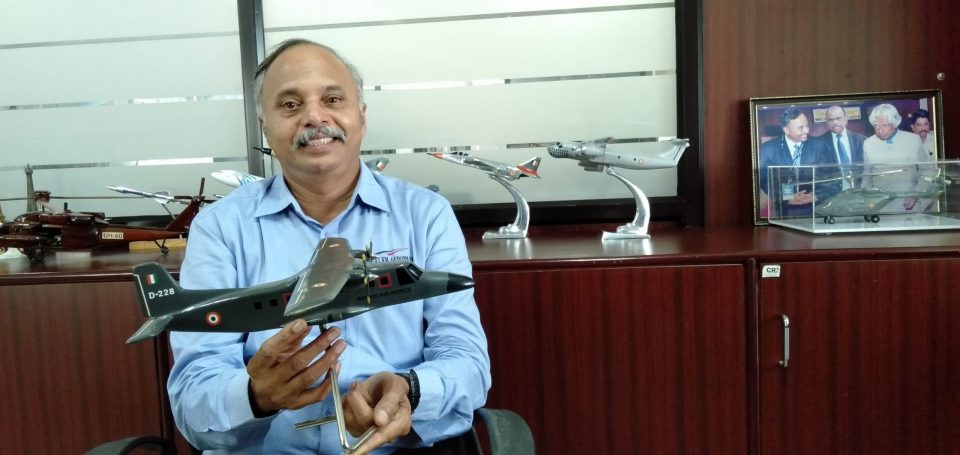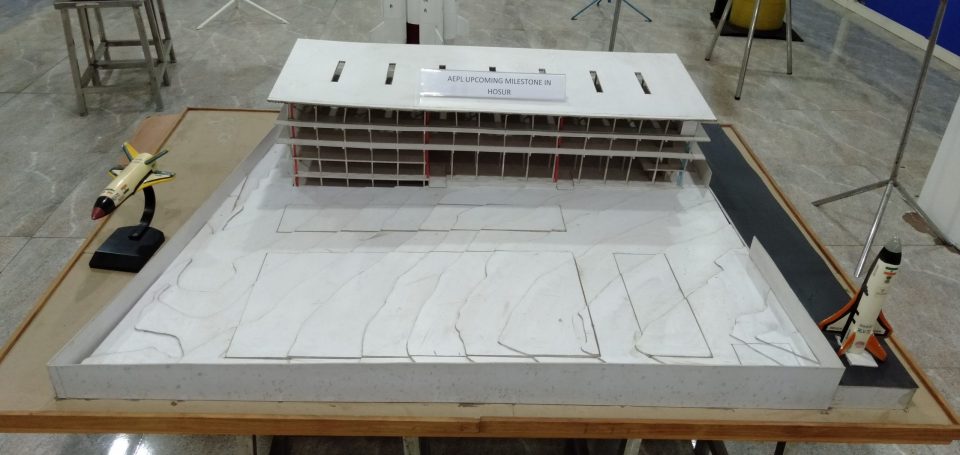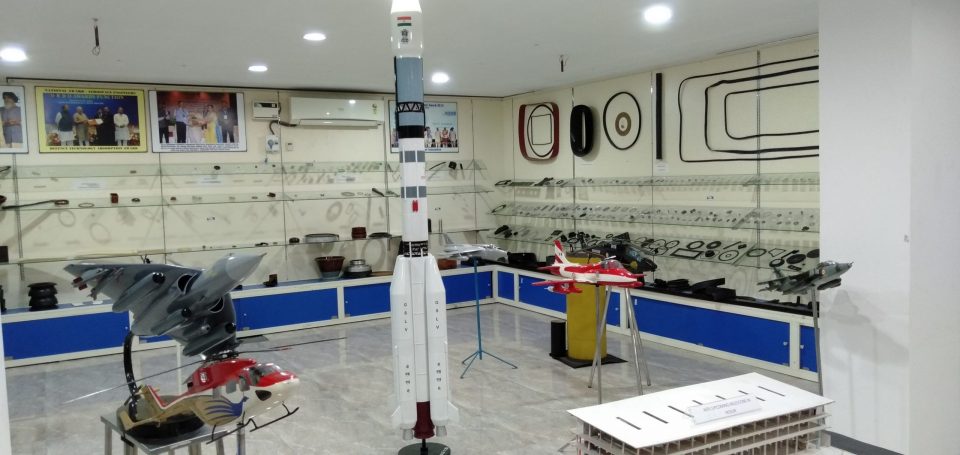
With Boeing order in bag, sky’s the limit for this Salem entrepreneur
From gasket couplings for domestic players to cockpit components for aerospace giants, R Sundaram’s journey speaks of grit and perseverance

A first-generation engineer’s desire for innovation has put Salem, Tamil Nadu, on the global defence and aerospace industry map. Sundaram Ramaswamy Naidu’s Aerospace Engineers Pvt Ltd (AEPL) was in the news recently for signing a long-term contract with US-based aerospace giant Boeing to manufacture and supply 683 critical components, from the first quarter of 2022.
While Sundaram has for long supplied parts to Boeing, he was a Tier-2 dealer. Now he will supply directly to the company, making it a first for Tamil Nadu. Over the next two years, AEPL will invest ₹150 crore in expanding its Salem facility as well as in a new manufacturing facility in Hosur, devoted to civil aerospace production, which will employ around 1,000 people.
“Clamps and fittings for the aircraft engines will be our first delivery,” said Sundaram, whose company also supplies components to Airbus and Rolls-Royce.
The Salem-based company’s expansion plan aligns with the state government’s ‘Make in Tamil Nadu’ initiative as well the Union government’s proposal to develop a defence corridor in the state. It also reflects Sundaram’s perseverance, and ability to dream big, in his over 30-year entrepreneurial journey.
Humble Beginnings
Sundaram, a polymer technologist from the Madras Institute of Technology, began his journey in 1988, at the age of 25, when he launched Elastomeric Engineers in Salem.
In the early years, he recognised the need to develop indigenous goods. The company went on to bag orders for aviation rubber products (gasket couplings) from BHEL. The PSU giant was quick to accept Sundaram’s design and product for two critical reasons — they were indigenous, and priced lesser than imported ones.
Having started with a ₹7-lakh loan from the National Small Industries Corporation in a 2,400sqft shed, Sundaram and his team moved from five orders to 500 units in four months. The first-year turnover was close to ₹45 lakh, Sundaram recalls.
Today, Sundaram’s AEPL, operating on 1,25,000sqft premises, makes a wide range of high-precision and high-quality parts and sub-assemblies for the aviation, defence and healthcare industries. It claims to have developed over 20,000 parts with stringent airworthiness quality.
Additionally, AEPL is setting up another 1,25,000sqft manufacturing facility, dedicated for civil aerospace production under the Make in India initiative, in Hosur. It is also expanding its existing Salem facility with an additional covered building space of 50,000sqft over the next two years at an investment of ₹150 crore.

The Kalam Factor
The energetic and affable Sundaram, who attended a Tamil-medium government school, was initially reluctant to take big steps, but soon overcame his inhibitions. A big break came in 1991, when he met late president APJ Abdul Kalam, whom he regards as his mentor and guide.
Kalam briefed him on the need to manufacture cockpit rubber seals in India, since a UK-based supplier was set to stop production in 1994, recalls Sundaram. With the help of Hindustan Aeronautics Ltd (HAL) and the Defence Research and Development Organisation (DRDO), he went on to manufacture the cockpit seal, a critical component needed to maintain cabin pressure.
India’s first astronaut Rakesh Sharma, a wing commander at HAL then, tested the cockpit seal. “We discovered that our seal could survive cabin pressure for 65 seconds, but imported cockpit seals could only withstand it for 14 seconds,” said Sundaram. “After successful testing, Sharma stated that our device is superior to the stimulator.”
From then, there was no looking back for Sundaram. “At present, we manufacture 16 types of cockpit seals, which are fitted in all the planes flying in Indian skies,” he said. “Many of our components are used in aircraft such as MIG-21, 27 and 29, Hawk Aircraft, Sukhoi SU 30, missiles such as Tejas, Brahmos and Akash, helicopters such as Dhruv, and rockets such as GSLV and PSLV.”
AEPL also makes components and products for the DRDO and the Indian Space Research Organisation (ISRO).
Taking on the ‘Big Boys’
The Salem entrepreneur’s achievement is remarkable given the field he operates in — aerospace and defence. The global players set the bar high in terms of quality, and require the entire value chain to be supremely cost-efficient. This leaves very little room for small suppliers, particularly SMEs (small and medium enterprise).
As S Christopher, former secretary of defence R&D and chairman of DRDO, stated, SMEs cannot compete with the ‘big boys’ unless they believe in their own skills. “It’s not simple to get a deal from the defence sector. Meeting the criteria and obtaining certification for your product are equally challenging. The gestation period takes years,” he said.
Though AEPL has been supplying products to Boeing for the past seven years, it was considered a Tier-2 supplier, since it was dealing through intermediaries. The recent deal has catapulted it to a Tier-1 supplier position, since it will ship products directly to Boeing, the world’s largest aerospace company.
AEPL operates with 400 employees, many of them ITI and diploma holders and 10th-grade pass candidates. They are all trained by the company. “I wanted to make use of the abilities of the people who live in the areas around the firm. They are trained to work in any department of the organisation. Such is the work culture we have at AEPL,” said Sundaram.
AEPL provides services in five verticals: high-precision engineering, rubber and composite moulding, testing facilities, electro-mechanical line replaceable modules, and missile subassemblies. “We also do aircraft MRO [maintenance, repair, and overhaul],” Sundaram added.

Cluster Objectives
Sundaram’s ascent in the aerospace industry aligns with India’s push to grow the domestic defence sector. The Centre’s proposals in this regard are meant to trim dependence on imports, save costs, and boost indigenous manufacturing under the Make in India initiative.
In 2019, then defence minister Nirmala Sitharaman announced the establishment of defence corridors in Uttar Pradesh and Tamil Nadu. The AIADMK government in the state rolled out a ‘Tamil Nadu Aerospace and Defence Industrial Policy 2019’, which identified Chennai, Coimbatore, Salem, Hosur and Tiruchi as defence corridor nodes.
Salem’s Geographic Edge
While Salem may seem an unlikely geography for a defence cluster, it offers various advantages. So much so that the state government has established a dedicated aerospace park — Salem Aeropark — to develop the segment. At present, AEPL is the only major player at Salem Aeropark.
The Tier-2 city is in close proximity to aerospace hubs Bengaluru and Hosur, which are, respectively, 160km and 40km away. Bengaluru is home to public sector companies such as HAL, National Aerospace Laboratory, ISRO and DRDO. Other large organisations such as Airbus, Boeing, Honeywell and Goodrich also operate there. This gives the Salem defence and aviation cluster immediate access to a vast talent pool.
“While Salem can offer cheaper land, the talent pool can be sourced from Bengaluru,” said Sundaram. Besides, with a relatively new airport and several aviation training centres and flying schools, the sector is seeing an uptake in industrial activity in the region.
Earlier this year, defence engineering company Crown Group signed a memorandum of understanding with Tamil Nadu Industrial Development Corporation (TIDCO) to develop an integrated aerospace cluster adjoining the Salem airport. The cluster, which is part of the Tamil Nadu Defence Corridor, will house India’s first-ever indigenous MRO facility for military aircraft and equipment.
However, the initiative is yet to take off. “There are certain internal concerns that need to be addressed within the organisation. They informed us that they will be back shortly,” said a senior TIDCO official.
Tamil Nadu’s Salvos
AEPL’s recent Boeing order has given a fillip to the Tamil Nadu government’s ambitious plan to grow its defence components industry. Chief Minister MK Stalin and other top government officials were present when the contract was signed. The government is looking to develop an ecosystem that comprises both large, established players and start-ups.
There are over 120 aircraft component manufacturing businesses in Tamil Nadu, according to Guidance Tamil Nadu, a nodal state government body for investment promotion. A majority of them are ‘indirect’ vendors. Government officials say they are in the process of selecting vendors with skill and other capabilities to become Tier-1 vendors for the aerospace and defence industries.
The state government has also engaged the services of consulting firm KPMG as a strategic partner to determine the potential and scope for defence industry growth in Tamil Nadu. According to reports, KPMG has already identified around 40 Tier-1 and Tier-2 firms, besides 300 ancillary entities as being part of the ecosystem.
Another key initiative of the government is the Defence Testing Infrastructure Scheme. This is projected to enhance the country’s defence and aerospace manufacturing sectors, according to N Ramachandran, president of the Aerospace Industry Development Association of Tamil Nadu in Chennai.


